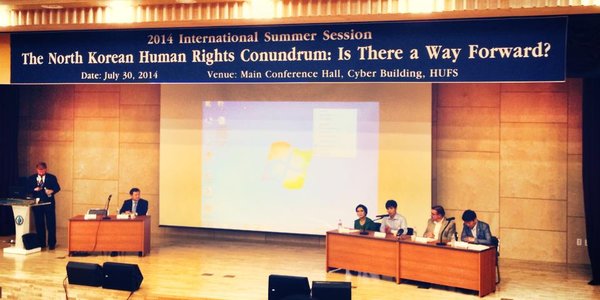 Image: Katty Chi/ North Korea Strategy Center |
Despite the publication of the Commission
of Inquiry on North Korea report this past March detailing human rights abuses
in that country on an immense scale, North Korea still continues to grab the
headlines due to its nuclear program or even the latest clothing trends in
Pyongyang. North Korea’s human rights abuses, unfortunately, are still
massively under-reported and their extent and implications still poorly
understood. “The North Korean Human Rights Conundrum: Is There a Way Forward,”
an event moderated by Committee for Human Rights in North Korea (HRNK) Gregg
Scarlatoiu, brought together three defector speakers and a long-time American
activist to examine what steps can be taken in this situation to improve and
bring more awareness to the human rights situation in North Korea.
Following a keynote address by ROK
Ambassador for Human Rights Jung-hoon Lee, three defector witnesses shared
their personal stories and opinions with the audience. Kim Young-soon, a former
dancer in North Korea, provided the story of her incarceration at Yoduk
Political Prison Camp in the 1970s and the immense suffering and loss she
suffered there. Kim Kwangjin, a former senior North Korean government official,
focused on his views on current events in the country. He argued that Kim Jong
Un was not at the head of current economic reforms in the country, but rather
“technocrats” who wanted reform and opening. Kim also made light of the fact
North Korea did not mention China at all during its July 27 Victory Day
celebrations, another harbinger that Sino-North Korean relations are on the
rocks. The final defector speaker, Shin Donghyuk, whose story gained
international attention through Blain Harden’s “Escape from Camp 14” – and,
perhaps for this reason forwent with any details of his story. Instead, he asked
the audience a question: What can you do right now to take action on NKHR?
Showing obvious signs of frustration, he expressed disappointment at endless
campaigns and simple talk about closing down political prison camps, and even
went as far as to imply that seminars like the current one was a waste of time.
Perhaps the most all-around interesting
speaker was Tim Peters, the head of Helping Hands Korea (HHK) and a long time
activist for North Korean refugees in China. During his talk, Peters focused on
current trends in HHK’s activities in China. He mentioned that the danger of
being repatriated back to North Korea from China is so severe that North Korean
refugee women commonly carry arsenic to commit suicide if need be. He also
shared HHK’s novel idea of sending “nureungji” (the burnt rice at the bottom of
a rice pot) into North Korea as food aid. He pointed out that nureungji is
considered “low-class” food by the elite in North Korea. Food aid to the
country typically comes under controversy because it is largely falls into the
hands of the elite. Peters implied that sending in nureungnji could ensure that
the food sent in would actually go to the lower rungs of North Korean society.
Peters also provided probably the only
concrete “ways forward” the seminar produced. He pointed out that North Korean
human rights-related NGOs fail to effectively communicate and collaborate with
each other. Peters proposed that NGOs could conduct monthly meetings to talk
about common issues, and conduct a cost-benefit analysis of current projects to
ensure that resources can be used effectively and collaboratively for larger
gains.
The seminar was held from 5-7 PM at
the Hankuk University of Foreign Studies on Wednesday, July 30, 2014.

















